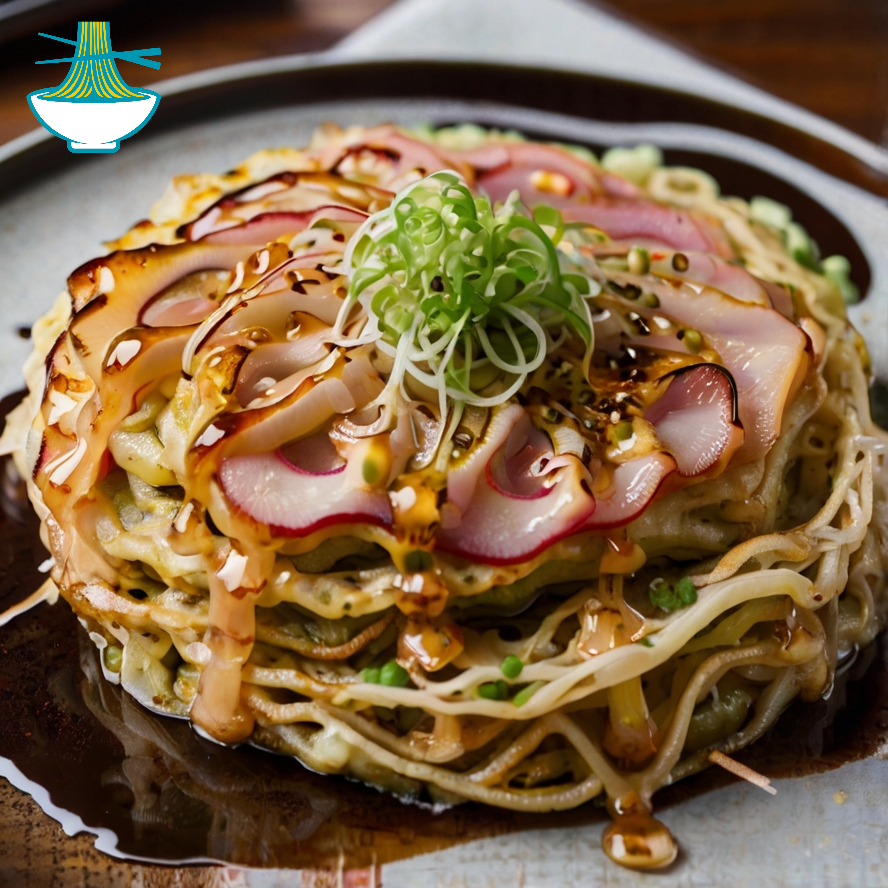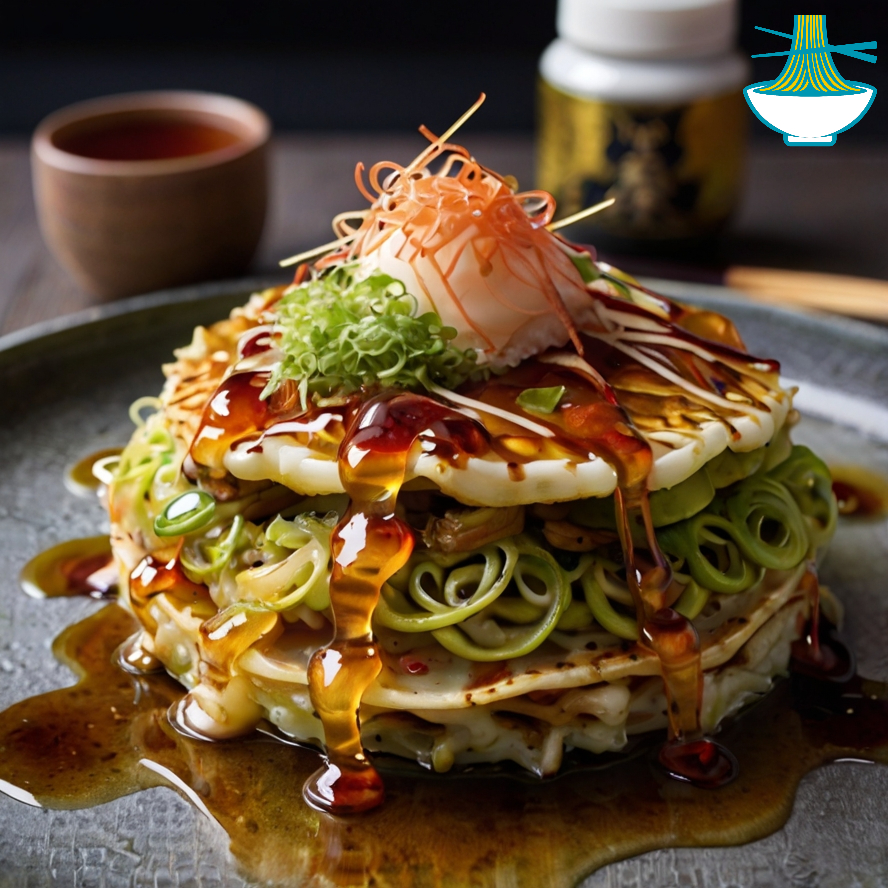Dive into the savory world of Okonomiyaki, a beloved Japanese dish that translates to "grilled as you like it." This culinary masterpiece hails from the bustling streets of Japan, offering a tantalizing blend of flavors and textures. Composed of a savory batter mixed with cabbage, green onions, and a variety of other ingredients such as seafood, pork, or even cheese, Okonomiyaki is cooked to perfection on a hot grill, resulting in a crispy exterior and a soft, flavorful interior. Topped with a medley of condiments including tangy Okonomiyaki sauce, creamy mayonnaise, and dried seaweed flakes, each bite is a delightful symphony of taste sensations. Whether enjoyed as a quick street food snack or as a comforting meal in a cozy restaurant, Okonomiyaki embodies the essence of Japanese culinary ingenuity and hospitality, inviting you to savor every delicious moment.
Ingredients:
- 2 cups all-purpose flour
- 1 cup dashi stock (you can substitute with water or chicken/vegetable stock)
- 2 large eggs
- 2 cups shredded cabbage
- 4 green onions, finely chopped
- 1 cup cooked protein of your choice (e.g., shrimp, squid, pork belly, thinly sliced beef)
- 1/2 cup Tenkasu (tempura scraps) or chopped cooked bacon
- 1/4 cup chopped pickled ginger (optional)
- Salt and pepper to taste
- Vegetable oil for frying
- Okonomiyaki sauce (store-bought or homemade)
- Japanese mayonnaise
- Aonori (dried seaweed flakes)
- Katsuobushi (dried bonito flakes)
Instructions:
1- In a large mixing bowl, combine the flour, dashi stock, and eggs. Whisk until smooth. The consistency should resemble pancake batter. If it's too thick, add a bit more dashi stock or water.
2- Add the shredded cabbage, green onions, cooked protein, Tenkasu or bacon, and pickled ginger (if using) to the batter. Mix until everything is evenly distributed. Season with salt and pepper to taste.
3- Heat a non-stick pan or griddle over medium heat and lightly coat it with vegetable oil.
4- Pour a portion of the batter onto the pan, spreading it out into a round shape, about 1/2 to 3/4 inch thick.
5- Cook the Okonomiyaki for about 4-5 minutes on each side, or until golden brown and crispy.
6- Once both sides are cooked, transfer the Okonomiyaki to a serving plate.
7- Drizzle Okonomiyaki sauce and Japanese mayonnaise over the top in a crisscross pattern.
8- Sprinkle Aonori and Katsuobushi on top as garnish.
9- Serve immediately, and enjoy your homemade Okonomiyaki!
Feel free to customize the toppings and fillings according to your preference. Okonomiyaki is a versatile dish, so don't hesitate to get creative with it!
Nutritional Values :
Here’s the breakdown of **Nutritional Values** and **Benefits** for the ingredients listed:
All-Purpose Flour (2 cups, ~240g):
- Calories: 880 kcal
- Fat: 2g
- Carbohydrates: 184g
- Protein: 12g
Benefits:
- Provides a base for the batter in the recipe.
- High in carbohydrates, supplying energy.
- Can be fortified with nutrients like iron and B vitamins.
Dashi Stock (1 cup, ~240ml):
- Calories: 5 kcal
- Fat: 0g
- Carbohydrates: 0g
- Protein: 1g
Benefits:
- Adds umami flavor to the batter.
- Provides a low-calorie, flavorful liquid base.
- Contains minerals from the fish and seaweed used in its preparation.
Large Eggs (2):
- Calories: 140 kcal
- Fat: 10g
- Carbohydrates: 2g
- Protein: 12g
Benefits:
- Excellent source of high-quality protein, supporting muscle repair and growth.
- Provides essential nutrients like vitamins A, D, E, and B12.
- Contains healthy fats and choline, supporting brain health.
Shredded Cabbage (2 cups, ~180g):
- Calories: 45 kcal
- Fat: 0.2g
- Carbohydrates: 10g
- Protein: 2g
Benefits:
- Rich in vitamins C and K, supporting immune function and bone health.
- Contains fiber, aiding digestion.
- Adds crunch and freshness to the dish.
Green Onions (4, finely chopped):
- Calories: 20 kcal
- Fat: 0g
- Carbohydrates: 5g
- Protein: 1g
Benefits:
- Provides vitamins A, C, and K, supporting immune function and bone health.
- Contains antioxidants that may reduce inflammation.
- Adds a fresh, mild onion flavor to the dish.
Cooked Protein of Choice (1 cup, ~200g, e.g., shrimp, squid, pork belly, thinly sliced beef):
Shrimp (for example):
- Calories: 150 kcal
- Fat: 1g
- Carbohydrates: 0g
- Protein: 30g
Benefits: High in protein and low in fat, provides essential nutrients like selenium and vitamin B12.
Tenkasu (Tempura Scraps, 1/2 cup) or Chopped Cooked Bacon:
Tenkasu:
- Calories: 120 kcal
- Fat: 6g
- Carbohydrates: 12g
- Protein: 2g
Benefits: Adds a crispy texture and flavor.
Chopped Cooked Bacon (1/2 cup):
- Calories: 200 kcal
- Fat: 18g
- Carbohydrates: 0g
- Protein: 12g
Benefits: Adds a rich, savory flavor and texture.
Chopped Pickled Ginger (1/4 cup, optional):
- Calories: 10 kcal
- Fat: 0g
- Carbohydrates: 2g
- Protein: 0g
Benefits:
- Adds a tangy, spicy flavor to the dish.
- Contains antioxidants and may aid digestion.
- Provides a vibrant color and additional flavor.
Salt and Pepper (to taste)
Salt:
- Calories: 0 kcal
- Fat: 0g
- Carbohydrates: 0g
- Protein: 0g
Benefits: Enhances the flavor of the dish, essential for maintaining fluid balance.
Pepper::
- Calories: 6 kcal (per teaspoon)
- Fat: 0g
- Carbohydrates: 1.5g
- Protein: 0.2g
Benefits: Adds a spicy flavor and may aid digestion.
Vegetable Oil (for frying, 2 tablespoons):
- Calories: 240 kcal
- Fat: 28g
- Carbohydrates: 0g
- Protein: 0g
Benefits:
- Adds healthy fats and helps with cooking.
- Provides energy and supports overall health.
Okonomiyaki Sauce (To taste):
- Calories: Varies (approx. 20-50 kcal per tablespoon)
- Fat: Varies (approx. 0-1g)
- Carbohydrates: Varies (approx. 4-10g)
- Protein: Varies (approx. 0-1g)
Benefits:
- Adds a sweet and savory flavor to the okonomiyaki.
- Enhances the overall taste profile of the dish.
- Should be used in moderation to manage sodium and sugar intake.
Japanese Mayonnaise (To taste):
- Calories: Varies (approx. 90 kcal per tablespoon)
- Fat: Varies (approx. 9g)
- Carbohydrates: Varies (approx. 1g)
- Protein: Varies (approx. 1g)
Benefits:
- Adds a creamy texture and tangy flavor to the dish.
- Contains healthy fats from the egg yolks.
- Provides some vitamins and minerals.
Aonori (Dried Seaweed Flakes, For garnish):
- Calories: 10 kcal (per tablespoon)
- Fat: 0g
- Carbohydrates: 2g
- Protein: 1g
Benefits:
- Rich in vitamins A, C, and K, supporting overall health.
- Contains minerals like iodine and calcium.
- Adds a subtle umami flavor and enhances the presentation of the dish.
Katsuobushi (Dried Bonito Flakes, For garnish):
- Calories: 40 kcal (per 1/4 cup)
- Fat: 0.6g
- Carbohydrates: 0g
- Protein: 9g
Benefits:
- Adds a rich umami flavor to the dish.
- Provides high-quality protein and essential minerals.
- Contains antioxidants and supports overall health.
These values are approximate and may vary based on factors such as the specific brands and quantities of ingredients used, as well as any variations in preparation methods.


Comments